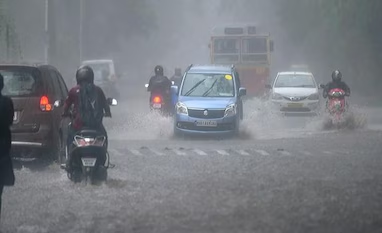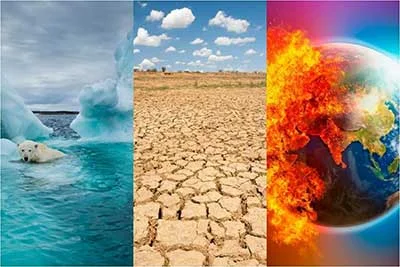The Impact of Climate Change on India: India, one of the most diverse and populous countries in the world, faces a number of challenges due to climate change. This phenomenon not only affects the environment but also has far-reaching implications for the country’s economy, public health and social fabric. In this article, we explore the impact of climate change in India and its implications for the future.
Rising temperatures and their consequences:
India has seen a significant increase in average temperatures over the past century. According to reports, the country’s average temperature has increased by about 0.7 degrees Celsius from 1901 to 2018. This seemingly small change has led to devastating heatwaves, especially in north and central India. Cities like Delhi and Rajasthan often record summer temperatures of more than 45 degrees Celsius, which pose serious health risks including heatstroke and dehydration.
Extreme heat also affects agriculture, reducing crop yields and threatening food security. For example, rice and wheat production, India’s main crops, are severely affected by heat stress, leading to economic and nutritional repercussions.
Unpredictable monsoons and water shortages:

India’s monsoon season, crucial to its agro-based economy, has become increasingly unpredictable due to climate change. The timing, duration and intensity of monsoons are no longer predictable, disrupting agricultural cycles and causing floods or droughts.
Regions such as Maharashtra and Karnataka often face severe water shortages, affecting both rural and urban populations. In addition, the shrinking of major rivers such as the Ganges and Brahmaputra threatens the water security of millions of people.
Increased frequency of extreme weather events:
Climate change has increased the frequency and intensity of extreme weather events in India. Cyclones, floods and droughts are becoming more frequent, causing widespread devastation. For example, Cyclone Amphan in 2020 left millions homeless in West Bengal and Odisha, causing over $13 billion in economic losses.
Floods have become an annual occurrence in states like Kerala, Bihar, and Assam, displacing thousands of people and damaging critical infrastructure. Conversely, droughts have crippled regions like Marathwada in Maharashtra, leading to migration and farmer suicides.
Impact on agriculture and food security:
Agriculture is the backbone of India’s economy, employing around 50% of the workforce. However, climate change poses a direct threat to this sector. Unpredictable rainfall patterns, rising temperatures, and soil erosion reduce agricultural productivity.
In addition, pests and diseases thrive in warmer climates, further threatening crop yields. Food security has become a significant concern, especially for India’s vulnerable populations, who rely on affordable staple foods.
Threats to biodiversity:
India is home to a diverse range of ecosystems, from the Himalayan mountains to coastal mangroves. Climate change is threatening these ecosystems, endangering wildlife and plant species. Himalayan glaciers are melting at an alarming rate, threatening the water supply of millions of people.
Similarly, the mangroves of the Sundarbans, a UNESCO World Heritage Site, are shrinking due to rising sea levels, causing endangered species such as the Bengal tiger. Coral reefs along India’s coast are also bleaching due to warming oceans, disrupting marine biodiversity.
Public health challenges:
Climate change directly affects India’s public health. Rising temperatures lead to heat-related illnesses, while erratic monsoons cause outbreaks of water-borne diseases such as cholera and typhoid. Floods create breeding grounds for mosquitoes, increasing the incidence of malaria and dengue.
Air pollution, exacerbated by warmer temperatures, poses another significant health risk. Cities like Delhi and Mumbai often report hazardous air quality levels, leading to respiratory and cardiovascular diseases.
Economic response:
The economic impact of climate change in India is profound. Natural disasters cause extensive damage to infrastructure, homes and livelihoods, requiring billions of dollars in recovery efforts. Agriculture, the backbone of the rural economy, is heavily affected, reducing farmers’ incomes and increasing poverty levels.
In addition, industries like tourism and fisheries, which depend on stable environmental conditions, are suffering due to the degradation of natural habitats.
Efforts to address climate change:
India is taking significant steps to address climate change. The government is committed to a renewable energy target of 450 gigawatts by 2030.
Reforestation projects, water conservation efforts, and investments in climate-smart agriculture are also helping to reduce climate risks. However, global cooperation is needed to address climate change, as its impacts transcend national borders.
The impacts of climate change in India are multifaceted, affecting every aspect of life. From rising temperatures and unpredictable monsoons to threats to biodiversity and public health, the challenges are immense. However, through concerted efforts at local, national, and global levels, India can mitigate these impacts and build a sustainable future. Combating climate change is not just an environmental imperative, but also essential for the country’s economic and social well-being.
Read Also: India Win T20 World Cup
![]()





